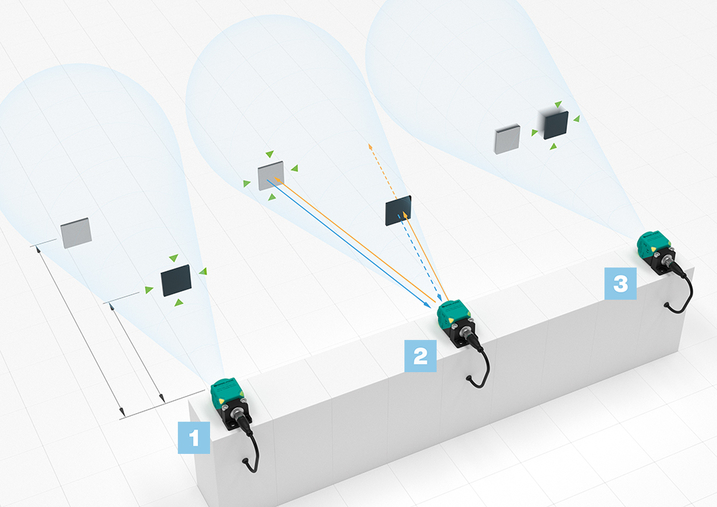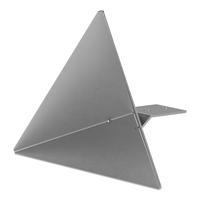Industrial radar sensors from Pepperl+Fuchs use electromagnetic waves or radar waves as a physical principle. These radar waves have special properties that make them ideal for automation applications where other sensory principles reach their limits: They are insensitive to interference, propagate close to the speed of light, and are reflected to varying degrees by virtually all materials. At the same time, they are able to penetrate most materials to some degree.
FMCW Radar Sensors with High Range

Three measurement modes allow nearly limitless freedom: 1. Closest Distance, 2. Best Reflection, 3. Fastest Velocity
Pepperl+Fuchs industrial radar sensors take advantage of these properties and continuously transmit a frequency-modulated radar wave in the ISM band range from 122 to 123 GHz. This functional principle, known as FMCW radar (frequency modulated continuous wave), makes it possible to cover a wide range of functions with just one type of radar sensor. For example, both distance and speed measurements can be carried out at a distance of more than 25 meters and the direction of movement of target objects can also be detected—without environmental influences such as rain, fog, wind, or dust having a relevant impact on the accuracy of the measurement results.
Three measurement modes allow nearly limitless freedom:
- Closest distance: material-independent detection of the object closest to the radar sensor
- Best reflection: Detection of the object with the best reflection properties, even through interfering objects
- Fastest velocity: Detection of the object moving fastest towards or away from the radar sensor
Radar Sensors for Mobile Machines
With sampling rates of up to 200 Hz, E1-comparable EMC values and an integrated CAN interface (CiA-301-compliant CANopen or SAE J1939), radar sensors from Pepperl+Fuchs are particularly suitable for integration in mobile machines (e.g., mobile crane, road construction, agricultural machinery). Vehicle-typical connections such as AMP Superseal or DEUTSCH ensure reliable and tight connections at all times. But radar sensors also offer a reliable solution in other application areas, such as collision avoidance for automated guided vehicles (AGVs) on forklifts or even for fill level monitoring in tanks.
Corner Reflectors as Helpful Accessories

If the reflective properties of a target object are to be improved or ideal alignment with the FMCW radar sensor is not possible, the Pepperl+Fuchs portfolio includes supplementary corner reflectors as accessories. Once such a metal corner reflector is attached to a target object, the radar cross section (RCS) of a target object increases significantly and the detectability by the radar sensor increases accordingly.







 +86 10 5901 7000
+86 10 5901 7000